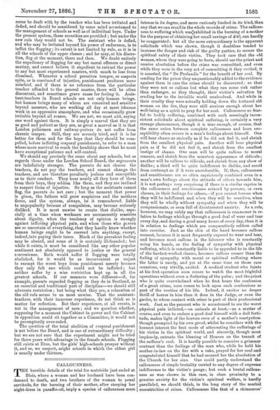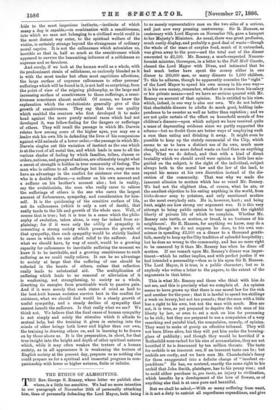CALLOUSNESS.
THE horrible details of the trial for matricide just ended at Blois, where a woman and her husband have been con- demned to death, and two brothers of the woman to penal servitude, for the burning of their mother, after steeping her night-drese in paraffin-oil, imply a species of callousness more intense in its degree, and more curiously limited in its kind, than any that we can recall in the whole records of crime. The callous- ness to suffering which was:exhibited in the burning of a mother for the purpose of obtaining her small savings of 240, can hardly be exaggerated ; but all the more extraordinary is the apparent solicitude which was shown, though it doubtless tended to increase the danger and risk of the guilty parties, to secure the spiritual safety of their victim. They took care that the old woman, whom they were going to burn, should see the priest and receive absolution before the crime was committed, and even while they were in the very act of committing it they recited, it is asserted, the "De Profundis " for the benefit of her soul. By sending for the priest they unquestionably added to the evidence against them in case the crime should be discovered ; so that they were not so callous but what they ran some risk rather than endanger, as they thought, their victim's salvation by sending her to the invisible world unabsolved. And while in their cruelty they were actually holding down the tortured old woman on the fire, they were still anxious enough about her well-being as a spirit to pray for her soul. Callousness so fear- ful to bodily suffering, combined with such seemingly incon- sistent solicitude about spiritual suffering, is certainly a very strange phenomenon, though it is true enough, of course, that the same union between complete callousness and keen sus- ceptibility often occurs in a man's feelings about himself. One will bear shame as stoically as if he did not feel it, and shrink from the smallest physical pain. Another will bear physical pain as if he did not feel it, and shrink from the smallest vestige of shame. One man will be quite callous to moral censure, and shrink from the minutest appearance of ridicule ; another will be callous to ridicule, and shrink from any show of dislike ; a third will be quite indifferent to dislike, and recoil from contempt as if it were unendurable. If, then, callousness and sensitiveness are so often capriciously combined even in a man's own feelings about the attitude of others towards him, it is not perhaps very surprising if there is a similar caprice in the callousness and sensitiveness evinced by persons, or even classes, in their feelings for others,—if ycn cannot foresee when they will be indifferent and when they will be sensitive, when they will be wholly without sympathy and when they will be compassionate, or even full of disinterested anxiety. As a rule, however, we may safely say that callousness is commoner in re- lation to feelings which go through a good deal of wear and tear every day, and during a good many hours of every day, than it is in relation to feelings which are comparatively seldom called into exercise. Just as the skin of the hand becomes callous soonest, because it is most frequently exposed to wear and tear, and becomes most callous in the labourer who is constantly using his hands, so the feeling of sympathy with physical suffering, which is constantly liable to be appealed to in the life of the hardest-worked classes, becomes callous sooner than the feeling of sympathy with moral or spiritual suffering where the latter is rarely, and yet at the same time on those rare occasions, very vividly, excited. A medical student who faints at his first operation soon comes to watch the most frightful operations without even a fluttering of the pulse; and the priest who is quite overwhelmed when he first hears the confession of a groat crime, soon comes to look upon such confessions as part of the routine of his life. Indeed, it excites no deeper thrill of horror in him than it does in the Judge, or even the gaoler, to whom contact with crime is part of their professional work. Just so the peasant who is accustomed to see the worst physical pain inflicted,—on animals at least,—ao a matter of course, and even to endure a good deal himself with a dull forti- tude, makes light of the horrors even of a mother's martyrdom though prompted by his own greed, whilst he considers with the keenest interest the best mode of attenuating the sufferings of his victim in the spiritual world, and sincerely, though most impiously, entreats the blessing of Heaven on the transit of the sufferer's soul. It is hardly possible to conceive a grimmer contrast than the feelings of the man who, while he held his mother-in-law on the fire with a rake, prayed for her soul and congratulated himself that he had secured her the absolution of the Church for her sins. One could partly understand the callousness of simple brutality carried to any degree of supreme indifference to the victim's pangs ; but such a brutal callous- ness as was shown in this case, in close proximity to a genuine anxiety for the victim's spiritual welfare, is hardly paralleled, we should think, in the long story of the morbid eccentricities of crime. Callousness like that of a rhinoceros'
hide to the most imperious instincts,—instincts of which many a dog is capable,—in combination with a sensitiveness, into which no man not belonging to a civilised world could in the most distant way enter, to the spiritual welfare of the victim, is certainly strange beyond the strangeness of ordinary moral caprice. It is not the callousness which astonishes us, horrible as that is, half so much as the sensitiveness which appeared to survive the benumbing influence of a selfishness so supreme and so ferocious.
And surely, if we look at the human world as a whole, with its predominant strain of selfishness, so curiously blended as it is with the most tender but often most capricious affections, the large surface of supreme callousness to other persons' sufferings which will be found in it, is not half so surprising, from the point of view of the reigning philosophy, as the large and increasing surface of sensitiveness to those sufferings, a sensi- tiveness sometimes almost morbid. Of course, we know the explanation which the evolutionists generally give of this growth of sensitiveness. They say that the one quality which enabled the creature who first developed it to make head against the more purely animal races which had not developed it, was fellow-feeling for the dangers or sufferings of others. They will recall the passage in which Mr. Darwin relates how among some of the higher apes, you may see a leader risk his own life in defending the lives of his companions against wild animals of a lower order,—the passage in which Mr. Darwin singles out this variation of instinct as the one which is at the root of all social ties, and which leads in men to all the various shades of feeling by which families, tribes, classes or orders, nations, and groups of nations, are ultimately taught what a secret of strength is hidden in true community of feeling. The man who is callous to all sufferings but his own, may seem to have an advantage in the conflict for existence over the man who is a doable suffeser,—a sufferer on his own account and a sufferer on his brother's account also ; but in reality, say the evolutionists, the man who really cares to relieve the sufferings of others is the one who earns the largest amount of forbearance, sympathy, and consideration for him- self. It is the quickening of the sensitive surface of life, not its callousness (which is only a sort of death), that really tends to the life and growth of the whole race. Well, of course that is true; but it is true in a sense which the philo- sophy of evolution, taken alone, is very far indeed from ex- plaining; for if it were only the utility of sympathy in cementing a strong society which promotes the growth of that sympathy, then such sympathy would be strictly limited to cases in which we can afford relief to the sufferer. And what we should have, by way of result, would be a growing capacity for callousness to inevitable suffering the moment we knew it to be inevitable, and a growing sensitiveness to such suffering as we could really relieve. It can be no advantage to society at large that the suffering of one should be reflected in the hearts of others, unless that reflection
really leads to substantial aid. The multiplication of suffering which leads to no removal or alleviation of it is weakening, not strengthening, to society as a whole, diverting its energies from practicable work to passive pain. And if it were merely that such states of mind as lead to the best.knit human societies survive best in the conflict for existence, what we should find would be a steady growth of useful sympathy, and a steady decline of sympathy that cannot benefit the sufferers. Is that really what we see P We think not. We believe that the final cause of human sympathy is not simply and solely the stimulus which it affords to mutual help, but the training it gives in entering into the minds of other beings both lower and higher than our own, the training in drawing others on, and in learning to be drawn on by those above us. It is the preparation, in short, for that true insight into the height and depth of other spiritual natures which, while it may often weaken the texture of a human society, as in all appearance it is weakening the texture of English society at the present day, prepares us as nothing else could prepare us for a spiritual and immortal progress in com- panionship with lower or higher natures, finite or infinite.







































 Previous page
Previous page